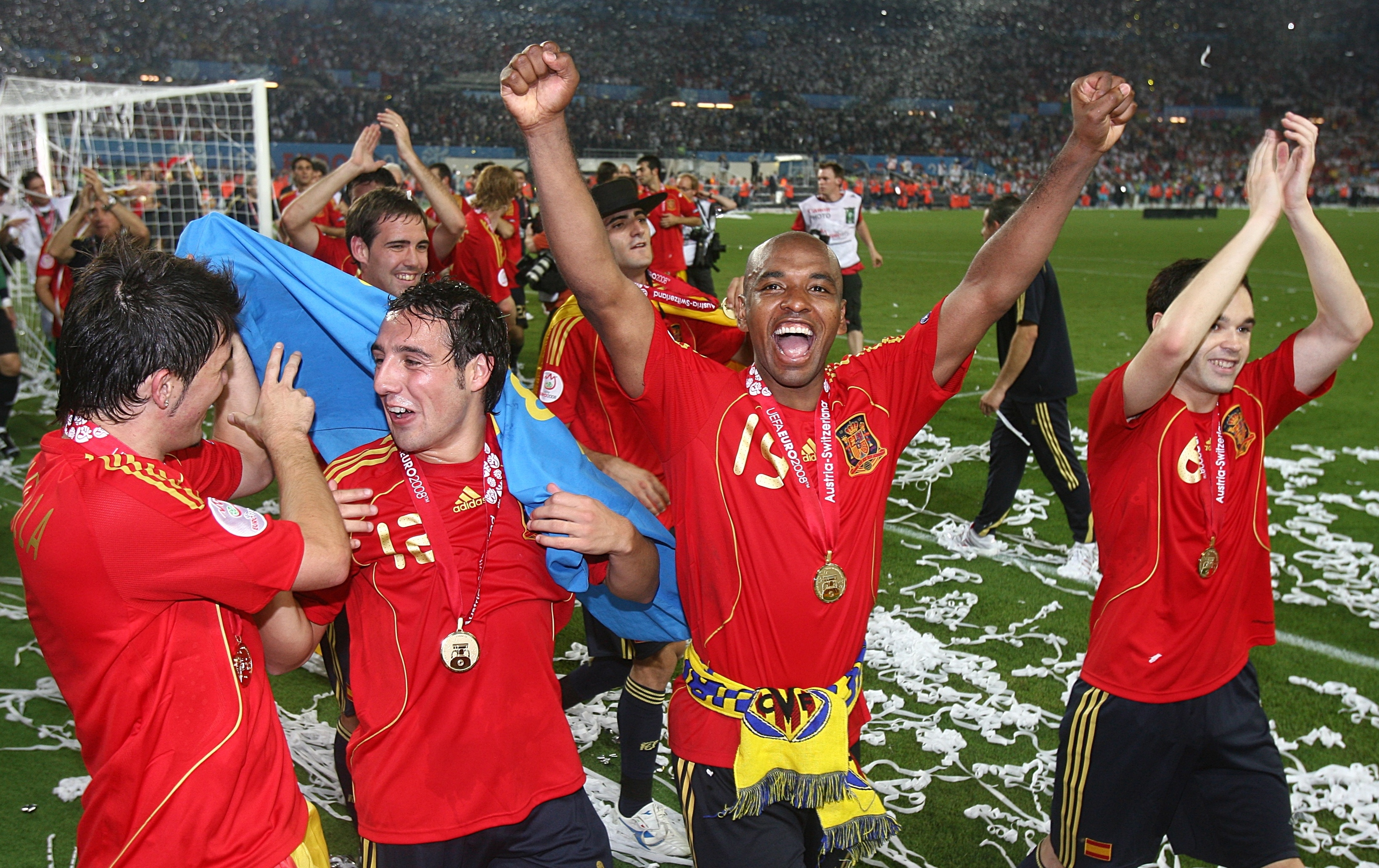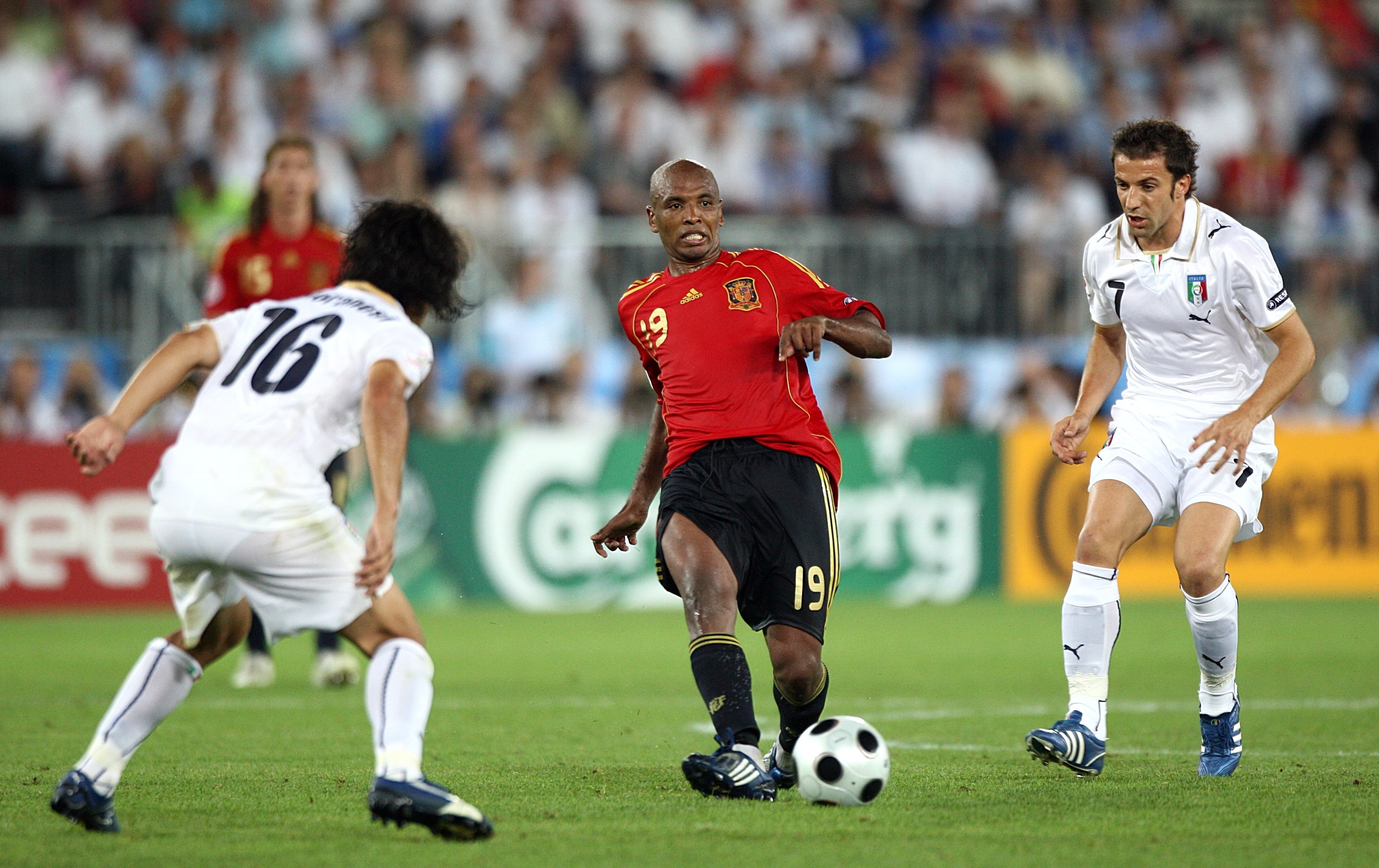"It was unreal, but it happened" - Marcos Senna on Spain's Euro 2008 triumph
Marcos Senna bagged Euros success with La Roja after shining for Villarreal – and nearly signing for Manchester United

This interview with Marcos Senna is from the Euro 2020 preview issue of FourFourTwo. Subscribe now and never miss an issue!
Which moments stand out in your career?
I must mention my first Champions League season at Villarreal in 2005/06, and the Euro 2008 title with Spain. Those were incredible moments. Reaching the Champions League semi-finals with an underdog like Villarreal was something special, then the European glory with Spain was even better. We played a perfect tournament and the victory was deserved – I doubt anyone would disagree.
You were born in Brazil but chose to play for Spain. How did that happen?
I’d never thought about it before the chance arose in 2005. Spain boss Luis Aragones said he'd consider calling me up for the national team if I agreed to play for Spain. I said yes.
What was it like working with Aragones?
Very nice. Before working with him I thought he was distant to his players – someone with a strong personality who was difficult to work with. That wasn’t the case at all, though. He was a lovely man and we loved making jokes with him. Most importantly, there was huge respect. In every team talk he'd tell us there wasn’t a better side than ours, then add, “But that doesn’t mean anything if we don’t bring energy onto the pitch.”
Get FourFourTwo Newsletter
The best features, fun and footballing quizzes, straight to your inbox every week.
How was the mood in Spain's squad during Euro 2008, with so many Real Madrid and Barcelona rivals together?
The ambience was very good. Everyone knew that any internal rivalries should stay out of the national team. Spain had gone 44 years without winning the Euros, the chance was there and we couldn’t miss it because of any internal issue. We stuck together and fought for the common desire of being champions.
Who were the main leaders of that team?
There weren’t main ones – Iker Casillas was the captain of Real Madrid, Carles Puyol was the captain of Barça, Carlos Marchena was the captain of Valencia, I was the captain of Villarreal. That group was very professional.
How did you find playing alongside Andres Iniesta and Xavi in midfield?
A privilege. I was responsible for all the dirty work – I had more defensive responsibilities. Iniesta, Xavi and David Silva were in front of me, so my task wasn’t too hard because we basically always had possession! [Laughs] We didn't suffer a lot. You’d pass the ball to them and no matter the situation, they'd find the perfect solution. Football seems simple with guys like that.
In the last eight against Italy, you scored in the penalty shootout as Spain won.
I said we didn’t suffer much, but that match against Italy was the exception. We weren’t in charge like the other games, and we could have lost. When it comes to the shootout in such a crucial competition, you feel nervous to have that responsibility. Italy represented a trauma for us – Spain were always losing to Italy and also had a quarter-final curse. So, put that all together: Italy, quarter-final and shootout, and tell me you don’t get nervous before taking your penalty. No way! [Laughs] But I’d scored important penalties before in my career, including in the Copa Libertadores final. Luckily, it went well for us. Beating Italy took a big weight off our shoulders.

How much do you remember about beating Germany 1-0 in the final?
I was very anxious ahead of the final. One of the hardest things is enjoying a good night's sleep before such a huge game. I took some medicine to get me to sleep. Spain fans were singing outside our hotel that night, giving us their support, but that didn’t help in terms of falling asleep! [Laughs] Germany had control during the first 15 minutes of the match, but after that we were able to regain possession and did what we liked to do: passing, passing, passing and more passing. We played better than the Germans that night.
What went through your mind at full-time?
It’s ours! Is this happening to us? Those were my first thoughts. I also had an odd thought – I remembered what I felt watching the Euro 2004 Final. I got emotional seeing the Greeks winning it, then I was doing the same thing four years on. It was unreal, but it happened and was one of the happiest days of my life.
Any funny moments amid the celebrations?
Ah, you made me remember the celebrations after the win against Italy. It was wild! David Villa left the dressing room in his underwear to throw champagne at reporters, and I got a bit drunk. After 120 minutes plus penalties, not to mention the mental stress, it doesn't take too much champagne! I think that party was even bigger than the one after the final.
You were in the best XI of Euro 2008, and some people claimed you were the player of the tournament. Were you?
I can only say I was feeling very good at that moment. I was in top form, certainly the best of my entire career. It’s a great sensation to have played a solid tournament and to hear that some people said I was the best player.
You mentioned Villarreal's run to the last four of the Champions League in 2005-06. What did that mean to you?
It’s hard to describe that feeling. The whole city came together – we were living a dream. Villarreal became a different club afterwards, and I’m proud to have been part of that. We topped a Champions League group including Manchester United and Benfica, then we had that beautiful run to the semis. It’s a shame we lost to Arsenal – if you analyse both legs, they weren’t superior to us.
What was it like to play with Juan Roman Riquelme and Diego Forlan?
Two great players with strong personalities. If Forlan was unmarked and you took a shot instead of passing, he wouldn’t celebrate the goal because he wanted to score it! [Laughs] Riquelme was a genius. If we were in a tough situation, the plan was to give him the ball – he’d find a solution, a bit like Xavi. Riquelme could have been even greater were it not for his very bashful character.
How close were you to joining Manchester United in 2006?
Everything was done – we agreed a five-year deal, but Sir Alex Ferguson told me to wait as there was a new rule in England. I think they had to bring in an English player, I’m not sure. But it went on for two weeks, then Villarreal offered me a new deal and I decided to stay. Also, my wife was keen to stay in Spain. She doesn’t like football much – she didn’t know the importance of United! [Laughs] After that, Arsene Wenger asked me if I’d like to sign for Arsenal, but I’d given my word to Villarreal.
You ended your career at New York Cosmos. How was that experience?
Fantastic. I was nearly 37 and hadn’t been to the USA, then I found myself in New York with a historic team. That was the perfect ending.
This article first appeared in the June 2021 issue of FourFourTwo
Subscribe to FourFourTwo today and get a free Euro 96 shirt!
NOW READ
SPAIN AT EURO 2020 Luis Enrique's 24-man squad for the finals
EURO 2020 STADIUMS Host cities, capacities, and everything you need to know
EURO 2020 WALLCHART Download free with schedule, fixtures and dates
